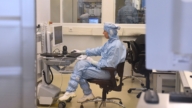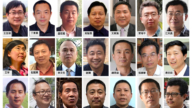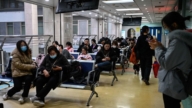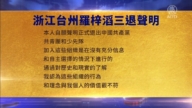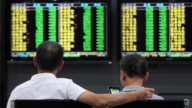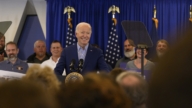【新唐人2013年02月25日訊】《維基解密》公布的一份密電顯示,10年前,中共領導人胡錦濤、溫家寶剛上臺時,曾試圖放鬆媒體管制、要求高官公布財產,但這些措施因為遭到既得利益集團的反對而受挫。下個月,中共當局將在北京召開全國「人大」與全國「政協」會議,與此同時,國家主席胡錦濤及國務院總理溫家寶任期屆滿,將退休卸任,由習近平與李克強接班。但外界質疑,面對中共體制殘局和越發嚴重的執政危機,他們究竟又能走多遠?下面請看報導。
《維基解密》披露的這份保密(Confidential)電文,是由美國駐北京大使館發往美國華府。美國中文網站《看中國》編譯電文,內容揭示,2003年9月19號,美國官員和北京大學「政治發展與政府管理研究所」所長謝慶奎,曾經討論了中國大陸當時的政治局勢。
電文中,謝慶奎說,「胡溫」新政府試圖在政府及中共的運作上推動一些開放,以展示他們的親民,也想給腐敗「解毒」。
謝慶奎說:「胡溫政府」還提出了要求高級別的政府官員及其家屬公開財政狀況的提案,但遭到中央政治局常委會的否決,其中只有胡錦濤和溫家寶對這項提案投了贊成票。謝慶奎表示,這項措施尤其會威脅到高層領導人們的子女。
對此,原「中國人民公安大學」法律系講師、資深法學專家趙遠明向《新唐人》表示,大陸當局一再叫嚷要公布官員財產狀況,但中共已經整體腐爛,因此這一提議在整個體制中遭到極大抵制。
原「中國人民公安大學」法律系講師趙遠明:「從這一點、從側面就反映出,中共領導層已經徹底爛掉了。你如果沒有大的決心、強力的手段,很難實現公布財產、廉潔奉公、憲政夢。」
北京時政觀察人士華頗則指出,相對「胡溫」當初而言,10年後的中共政權,面臨空前的危機,中國已走到了巨變的前夜,因此「胡溫」的繼任者習近平、李克強為避免亡黨,不斷強調要加強反腐,並再次提出實行官員財產公開。
北京時政觀察人士華頗:「我估計,習、李要以反腐為突破口,要進行一場正在精心佈置的黨內大清洗,以反腐為名清洗一些人,樹立自己的威信。」
美國駐北京大使館的電文還披露,胡錦濤當初曾採取一些小步驟給媒體「鬆綁」,但因為中共十六屆三中全會即將召開,並且擔憂對前中共黨魁江澤民的批評,當局加緊了對媒體的管制,並禁止討論「政改」。
華頗:「當初胡溫上臺提出了以人為本,讓人耳目一新,對媒體有所放鬆,被人稱作為『小陽春』。但是這種放鬆,是以不能危害中共的核心利益為前提的,所以後來人們覺得突然間形勢急轉直下。」
趙遠明則指出,目前雖然劉雲山不再擔任中宣部長,但在新任政治局常委分工中,劉雲山仍然主掌文宣大權。
趙遠明:「習、李要想在媒體上真正邁出開放自由比較大的步伐,就是要在人事上給它一種徹底的改變。劉雲山就根本不應該讓他插手宣傳和媒體。」
趙遠明強調,在最近的「南周事件」中,新任中宣部長劉奇葆還是聽命於劉雲山。因此,習、李如果沒有得力人選去執掌中宣部、清除劉雲山對中宣部的掌控和影響,將很難改變當前形勢。
採訪/劉惠 編輯/李謙 後製/周天
WikiLeaks: Hu-Wen’s Anti-corruption Was Rejected by Politburo Standing Committee
In a cable released by WikiLeaks stated that 10 years ago,
Hu Jintao and Wen Jiabao, then new Chinese communist leaders,
attempted to push openness in both media and officials’ assets.
However, vested interest groups rejected the initiatives.
As both National People’s Congress and the National
Political Consultative Conference are approaching,
President Hu Jintao and Premier Wen Jiabao
will retire soon.
People are skeptical about how far the new leaders
Xi Jinping and Li Keqiang will go with the collapsing communist regime.
The following is our report.
This Confidential released by WikiLeak was issued
by the U.S. Embassy in Beijing and addressed to the Secretary of State in Washington DC.
The content revealed a political scene discussion on Sept. 19,
2003 with director of Beijing University’s Institute of Political Development and Governance, Xie Qingkun.
It revealed that both Hu and Wen were “pushing for
greater openness in government and party operations
in order to promote closeness to the people and
as an antidote to corruption.”
Xie Qingkun reported that, “an initiative of the Hu-Wen
government to require financial disclosure statements from
high-level government officials and their families
was rejected by the Politburo Standing Committee,
with only Hu Jintao and Wen Jiabao voting in support
of the measure.”
Xie Qingkun said, “Such a measure would particularly
threaten the children of high-level leaders.”
Zhao Yuanming, former law lecturer of Chinese People’s
Public Security University, told NTDTV that this initiative was surely resisted by the collapsing Communist regime.
Law lecturer Zhao Yuanming: “This information reflects
the complete collapse of the Chinese Communist leadership.
It requires a big commitment and strength to publicize official
property, and to realize a clean and honest government.”
Current affairs observer Hua Po believed that China is facing
an unprecedented crisis and on the eve of great change.
Xi Jinping and Li Keqiang, the successor of Hu-Wen government,
have to stress anti-corruption and raise the issue of property
declaration 10 years later to avoid the end of the party.
Current affairs observer Hua Po: “I would assume that Xi
and Li will use anti-corruption to clean and rearrange within the party and to establish their own support."
The Confidential also revealed that “Hu had taken
some small steps to make the media more “relevant" after assuming office.”
However, media control was tightened to avoid discussions
of political reform for the upcoming October Party Plenum
and the concern about criticism of Jiang Zemin
in newspapers.
Hua Po: “When Hu Jintao and Wen Jiabao first came
to power, it was known as the “Little Spring” for they proposed people-oriented policy and less media control.
However, when the core interests of the Communist regime
are threatened, the situation worsens suddenly."
Zhao Yuanming pointed out that although Liu Yunshan
is no longer director of the Central Propaganda Department,
his Politburo Standing Committee position still entitles him
the power in propaganda.
Zhao Yuanming: “To ensure openness in media,
the organization has to go through a major change.
Xi and Li should not allow Liu Yunshan to continue
his influence in the propaganda and the media."
Zhao Yuanming stressed that the recent Southern Weekly
incident showed that newly appointed director of propaganda, Liu Qibao, still takes orders from Liu Yunshan.
As long as Liu Yunshan continues to control and influence
the Central Propaganda Department, it will be difficult to change the current situation.


